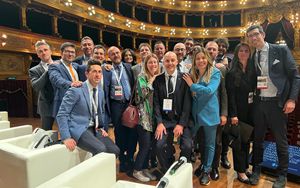(Finance) – “Encouraging professional aggregations is a necessity. Our proposal to speed up this issue is to allow subjects included in the flat-rate regime to participate in professional associations, albeit with well-defined parameters”. That’s what he said Matteo De Lise, president of the National Union of Young Chartered Accountants and Accounting Experts, during 60th national congress of the association in Palermo.
“The idea – he explains DeLise – is to consider within the compensation limit of 85,000 a year both the portion performed individually and the percentage of participation in the association. In the absence of the simultaneous individual VAT number of the members, the same associations, formed by all subjects with the requirements of the flat-rate regime, could thus potentially achieve a turnover of 85 thousand euros multiplied by the number of subjects, each of which would apply the flat rate. For VAT purposes, the association would instead apply the ordinary legislation of compensation and deduction of the tax and this would make it possible to overcome the problem of the Community VAT exemption limit of 85 thousand euros and would also be an advantage for the State”.
The second proposal of the Ungdcec concerns business income. “The idea is to carry tax losses backwards (currently they can only be carried forward) – he continues DeLise – . The suggestion was made at European level following the pandemic: by carrying the losses back, in fact, the same should be offset against previous profits and a tax credit would immediately accrue. It would therefore be an injection of liquidity for companies”. The proposals were presented together with the president of the Union’s Direct Tax Study Commission, Claudio Turi.
At the Teatro Massimo there were two days of debate with exponents of politics, professions and civil society. The heads of the National Council of Accountants, of the social security funds and of the territorial orders were present.
“The commitment of young accountants, at the forefront of making proposals related to taxation and the economy, – said FFrancesco Paolo Sisto, Deputy Minister of Justice – It is much appreciated. The government, despite being fully aware of the problems, is acting in the interest of the country on principles which, it seems to me, are bearing the hoped-for results. Today, finally, technology and politics go hand in hand, we are no longer faced with choices far from specific skills: the idea is to make skills increasingly a strong point of the country”.
For Andrea De Bertoldi, Finance Commission at Montecitorio“the government is working on a different, more ‘human’ tax system. The tax payer will no longer see the tax authorities as an enemy but as an interlocutor with whom to dialogue: I am thinking of compositions with creditors and the strengthening of compliance, but also of a flat tax which it will significantly simplify the mechanism. A tax system that will also provide concessions for companies that reinvest in their companies”.
“Professionals, called every day to mediate between the state, businesses and citizens,” he underlined Ettore Rosato, Foreign and Community Affairs Commission of the Chamber of Deputies – are an example for the politics of a country that is going through an economic and also a demographic crisis. We need new solutions that produce wealth, also exploiting the resources provided for by the Pnrr”.
They also spoke among others Luigi Marattin, Budget, Treasury and Planning Commission of the ChamberAnd Francesco Fimmanò, full professor of Commercial Law and scientific director of the Mercatorum University.
